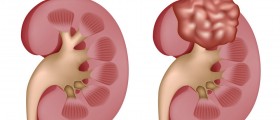
Cancer of the esophagus is not very common among American population, but it is known to affect some 15.000 people living in the United States each year. Although this type of cancer is not as frequent as cancers of the breast, prostate or the lungs, esophageal cancer is considered to be one of the deadliest there are. Out of 15.000 new cases diagnosed every year, over 14.000 people (over 90%) is expected to die from this disease, regardless of treatment.
In most cases esophageal cancer starts in the esophagus, but there are also patients who develop this cancer because of metastases (spread of cancer cells) of neck or head cancers. This condition is known as secondary cancer of the esophagus.
How to Recognize Esophageal Cancer?
Because of the severity of esophageal cancer it is extremely important to notice first signs and symptoms and react promptly, seeking medical assistance as soon as possible. Dysphagia (swallowing difficulty) is very common among symptomatic esophageal cancer patients. However, many of these people do not have any symptoms until the cancer grows to certain size. Other complaints may include unexpected weight loss, a sensation that the food is stuck in the throat or even pain while the patient tries to swallow something. Advanced stages of esophageal cancer are known to lead to coughing and vomiting blood, as well as hoarse voice.
There are different types of esophageal cancer with two most common, adenocarcinoma and squamous cell carcinoma, distinguished only by the type of cells that have been cancerously transformed. Adenocarcinoma starts in glandular cells of the esophagus, near the stomach, while squamous cell carcinoma may originate from any part of the esophagus. Neither of these cancers have a good prognosis or high survival rate.
How does Esophageal Cancer Spread?
Esophageal cancer in advanced stages is known to spread. Coughing and vomiting blood indicate that there are metastases in the trachea, while hoarse voice means that the cancer has spread to some local nerve.
This type of cancer may also affect regional lymph nodes, involving upper, middle or lower lymphatic trunk. Also, esophageal cancer can be seen to metastasize to some other organs of the body, usually the lungs and the liver.
Treatment and Survival
As we mentioned, any type of esophageal cancer does not have good prognosis. Patients usually do not live for a long period of time after diagnosis is established and patients treated. Therapy commonly includes chemotherapy, radiation and surgery. The first part of treatment is usually radiation therapy, performed in order to kill cells of esophageal cancer which grow extremely fast and thus decrease the size of the tumor. Even with combined treatment only 10 to 14% of all treated patients are expected to live for 5 years, mostly due to diagnosis of cancer in later stages.
- www.nhs.uk/conditions/oesophageal-cancer/
- www.nhs.uk/conditions/oesophageal-cancer/treatment/
- Photo courtesy of James Heilman, MD by Wikimedia Commons: commons.wikimedia.org/wiki/File:Esophageal_Candidiasis2010.JPG

















Your thoughts on this
Loading...